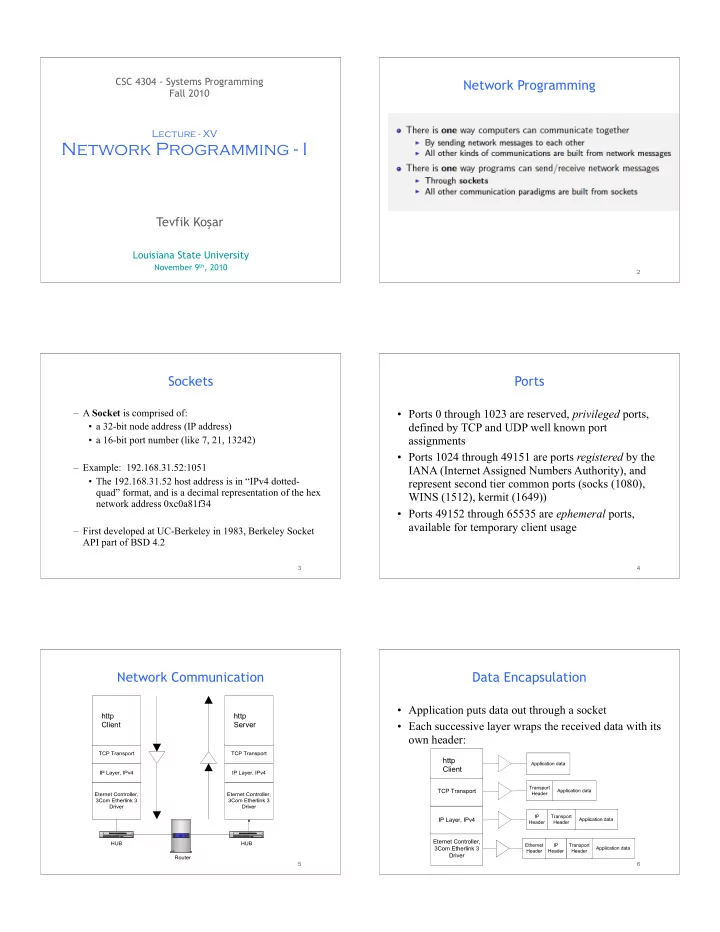

CSC 4304 - Systems Programming Network Programming Fall 2010 Lecture - XV Network Programming - I Tevfik Ko � ar Louisiana State University November 9 th , 2010 1 2 Sockets Ports – A Socket is comprised of: • Ports 0 through 1023 are reserved, privileged ports, • a 32-bit node address (IP address) defined by TCP and UDP well known port assignments • a 16-bit port number (like 7, 21, 13242) • Ports 1024 through 49151 are ports registered by the – Example: 192.168.31.52:1051 IANA (Internet Assigned Numbers Authority), and • The 192.168.31.52 host address is in “IPv4 dotted- represent second tier common ports (socks (1080), quad” format, and is a decimal representation of the hex WINS (1512), kermit (1649)) network address 0xc0a81f34 • Ports 49152 through 65535 are ephemeral ports, available for temporary client usage – First developed at UC-Berkeley in 1983, Berkeley Socket API part of BSD 4.2 3 4 Network Communication Data Encapsulation • Application puts data out through a socket http http • Each successive layer wraps the received data with its Client Server own header: http Client 5 6
TCP Header Format IP Header Format • Source and Destination ports • Packets may be broken up, or fragmented , if original data is too large for a single packet (Maximum • Sequence Number tells what byte offset within the Transmission Unit is currently 12k bits, or 1500 overall data stream this segment applies Bytes) • Acknowledgement number lets the recipient set what • Packets have a Time To Live, number of seconds/ packet in the sequence was received OK. rounds it can bounce around aimlessly among routers until it’s killed 7 8 Common Network Applications Well Known Services & Ports 9 10 TCP & UDP An HTTP Request • <command> <argument> <HTTP version> • <optional arguments> • <blank line> • GET /index.html HTTP/1.0 11 12
Example Server Response $ telnet www.cnn.com 80 Trying 64.236.90.21... • <HTTP version> <status code> <status message> Connected to www.cnn.com. • <aditional information> Escape character is '^]'. GET /index.html HTTP/1.0 • <a blank line> • <content> HTTP/1.1 200 OK Date: Thu, 06 Nov 2008 18:27:13 GMT Server: Apache • HTTP/1.1 200 OK Accept-Ranges: bytes Date: Thu, 06 Nov 2008 18:27:13 GMT Cache-Control: max-age=60, private Server: Apache Expires: Thu, 06 Nov 2008 18:28:14 GMT Content-Type: text/html <HTML><HEAD><BODY> .... Vary: Accept-Encoding,User-Agent Connection: close <!DOCTYPE HTML PUBLIC "-//W3C//DTD HTML 4.01 Transitional//EN""http:// 13 www.w3.org/TR/html4/loose.dtd"><html lang="en"><head><title>CNN.com - 14 Basics of a Server (Web, FTP ..etc) TCP Connection: Initial State 1. Listen to a Network port 2. Interpret incoming messages (requests) 3. Serve requests a. Read requested files b. Send them over network 4. Run consistently in the background (daemon process) 15 16 TCP Connection: Passive Open TCP Connection: Active Open 17 18
TCP Connection: Randezvous TCP Connection: more.. 19 20 • TCP Client-Server view Server Side Socket Details • Connection-oriented socket connections 21 22 Client Side Socket Details Example: A Time Server #include <stdio.h> #include <sys/types.h> #include <sys/socket.h> #include <netinet/in.h> #include <netdb.h> #define PORTNUM 8824 #define oops(msg) { perror(msg) ; exit(1) ; } 23 24
void main(int ac, char **av) { struct sockaddr_in saddr; /* build our address here */ while ( 1 ){ � struct � hostent � � *hp; /* this is part of our */ sock_fd = accept(sock_id, NULL, NULL); /* wait for call */ � char � hostname[256]; /* address � */ � � printf("** Server: A new client connected!"); � int � slen,sock_id,sock_fd; /* line id, file desc */ if ( sock_fd == -1 ) � FILE � *sock_fp; /* use socket as stream */ oops( "accept" ); /* error getting calls */ char *ctime(); /* convert secs to string */ long time(), thetime; /* time and the val */ sock_fp = fdopen(sock_fd,"w"); /* we'll write to the */ if ( sock_fp == NULL ) /* socket as a stream */ oops( "fdopen" ); /* unless we can't */ gethostname( hostname , 256); /* where am I ? */ hp = gethostbyname( hostname ); /* get info about host */ thetime = time(NULL); /* get time */ bzero( &saddr, sizeof(saddr) ); /* zero struct */ /* and convert to strng */ /* fill in hostaddr */ fprintf( sock_fp, "**************************************\n"); bcopy( hp->h_addr, &saddr.sin_addr, hp->h_length); fprintf( sock_fp, "** From Server: The current time is: "); saddr.sin_family = AF_INET ; /* fill in socket type */ fprintf( sock_fp, "%s", ctime(&thetime) ); saddr.sin_port = htons(PORTNUM); /* fill in socket port */ fprintf( sock_fp, "**************************************\n"); sock_id = socket( AF_INET, SOCK_STREAM, 0 ); /* get a socket */ fclose( sock_fp ); /* release connection */ if ( sock_id == -1 ) oops( "socket" ); � fflush(stdout); � � � /* force output */ } if ( bind(sock_id, &saddr, sizeof(saddr)) != 0 )/* bind it to */ } oops( "bind" ); /* an address */ if ( listen(sock_id, 1) != 0 ) oops( "listen" ); 25 26 Acknowledgments • Advanced Programming in the Unix Environment by R. Stevens • The C Programming Language by B. Kernighan and D. Ritchie • Understanding Unix/Linux Programming by B. Molay • Lecture notes from B. Molay (Harvard), T . Kuo (UT- Austin), G. Pierre (Vrije), M. Matthews (SC), B. Knicki (WPI), M. Shacklette (UChicago), J. Kim (KAIST), A. Dix (Hiraeth), and J. Schaumann (SIT). 27
Recommend
More recommend